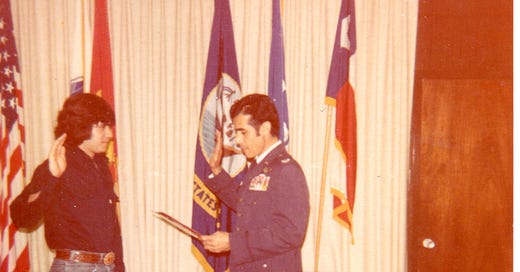I was sixteen when I started my senior year of high school. Then, before graduation in May of ’76, having just turned seventeen, I enlisted in the Navy. Mind you, it was on the DEP (delayed enlistment program), so I wouldn’t actually enlist until I turned eighteen or just before departure to boot camp. Anyway, on that fateful day, Dad being “The Colonel,” swore me in, leaving for basic on the 14th of February 1977, and arriving in the freezing cold of Waukegan, Illinois. Barbara, she didn’t even get a box of chocolates before I boarded that “big ole jet airliner,” after swearing “I do” to an oath, not even knowing what I supported or what it meant: I, _____, do solemnly swear that I will support and defend the Constitution of the United States against all enemies, foreign and domestic; that I will bear true faith and allegiance to the same; and that I will obey the orders of the President of the United States and the orders of the officers appointed over me, according to regulations and the Uniform Code of Military Justice. So help me God (oath of enlistment). Trust me, my main goal in life at the time: Party!
Seriously, at eighteen, I had no idea what I was getting into, but I’d learn. Only, much later after “serving” and having finally read the Constitution. Damn was I stupid! Which had me delving further into the history of history, and upon deeper examination, wondering if history’s been on a repeat cycle for history’s sake: Candor will oblige us to admit that even such men may be actuated by upright intentions; and it cannot be doubted that much of the opposition which has made its appearance, will spring from sources, blameless at least, if not respectable; the honest errors of minds led astray by preconceived jealousies and fears. So numerous indeed and so powerful are the causes which serve to give a false bias to the judgement, that we, upon many occasions, see wise and good men on the wrong as well as on the right side of the questions for the first magnitude to society. This circumstance, if duly attended to, would furnish a lesson of moderation to those who are ever so much persuaded of their being in the right in any controversy. And a further reason for caution, in this respect, might be drawn from the reflection that we are not always sure that those who advocate the truth are influenced by purer principles than their antagonists. Ambition, avarice, personal animosity, party opposition, and many other motives not more laudable than these, are apt to operate as well upon those who support, as upon those who oppose, the right side of a question. Were there not even these inducements to moderation, nothing could be more ill-judged than that intolerant spirit which has, at all times, characterized political parties. For in politics, as in religion, it is equally absurd to aim at making proselytes by fire and sword. Heresies in either can rarely be cured by persecution (Federalist 1).
And I get division. During the Revolution: Patriot versus Loyalist. Then the constitutional debates: Federalist versus Anti-Federalist. Then after all the party shakeups: Democrat versus Republican. The rally cry of supposed truth over the Constitution and which party is right. Not even a more or less right, but just flat right, the constitutionality of an issue irrelevant. So much, one must loyally accept party dictates without waver. Case in point: USAID (United States Agency International Development), including all the waste and fraud recently exposed. Yet, where one stands with Party, dictates whether the agency is/was in or out of bounds. Not having been right or wrong, just look past the entirety of waste, fraud, abuse and see the supposed good.
Worse, every legislator, whether Democrat or Republican has been guilty of USAID complicity either through commission or omission: All legislative Powers herein granted shall be vested in a Congress of the United States, which shall consist of a Senate and House of Representatives (Constitution/Article I/ Section 1), understanding; All Bills for raising Revenue shall originate in the House of Representatives; but the Senate may propose or concur with Amendments as on other Bills (Constitution/Article I/Section 7/First Clause). Thus, to dismiss outright the fraud and corruption or to feign complete surprise at the fraud and corruption, understanding that every legislator voted for the fraud and corruption, including presidents, who upon knowing legislation was being passed and did nothing, are complicit. Which begs: How does one know the right or wrong of an issue? The short answer: Learn the Constitution. And when it comes to the Constitution, one must decide which side of the fence they prefer, similar to the American Revolution. Except today, one either stands for the Constitution (Patriot) or against it: Party (Loyalist). And thinking of one while enlisted, what was/is one to do even if unconstitutional “that I will obey the orders of the President of the United States and the orders of the officers appointed over me,” if one never understood/stands the Constitution when enlisted. A conundrum and discombobulation of epic ponderment. Plus, shouldn’t the same precepts of knowledge to “support and defend” apply to everyone? Especially those who vote. Suggestion: Don’t be stupid, understanding which “Party” one is referring to.





Which party?